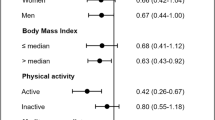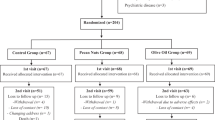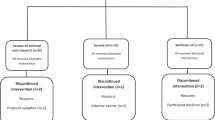Abstract
Background:
Despite the marked increase in cardiovascular risk factors in Spain in recent years, the prevalence and incidence of cardiovascular diseases have not risen as expected. Our objective is to examine the association between consumption of olive oil and the presence of cardiometabolic risk factors in the context of a large study representative of the Spanish population.
Subjects and methods:
A population-based, cross-sectional, cluster sampling study was conducted. The target population was the whole Spanish population. A total of 4572 individuals aged ⩾18 years in 100 clusters (health centers) were randomly selected with a probability proportional to population size. The main outcome measures were clinical and demographic structured survey, lifestyle survey, physical examination (weight, height, body mass index, waist, hip and blood pressure) and oral glucose tolerance test (OGTT) (75 g).
Results:
Around 90% of the Spanish population use olive oil, at least for dressing, and slightly fewer for cooking or frying. The preference for olive oil is related to age, educational level, alcohol intake, body mass index and serum glucose, insulin and lipids. People who consume olive oil (vs sunflower oil) had a lower risk of obesity (odds ratio (OR)=0.62 (95% confidence interval (CI)=0.41–0.93, P=0.02)), impaired glucose regulation (OR=0.49 (95% CI=0.28–0.86, P=0.04)), hypertriglyceridemia (OR=0.53 (95% CI=0.33–0.84, P=0.03)) and low HDL cholesterol levels (OR=0.40 (95% CI=0.26–0.59, P=0.0001)).
Conclusions:
The results show that consumption of olive oil has a beneficial effect on different cardiovascular risk factors, particularly in the presence of obesity, impaired glucose tolerance or a sedentary lifestyle.
This is a preview of subscription content, access via your institution
Access options
Subscribe to this journal
Receive 12 print issues and online access
$259.00 per year
only $21.58 per issue
Buy this article
- Purchase on Springer Link
- Instant access to full article PDF
Prices may be subject to local taxes which are calculated during checkout


Similar content being viewed by others
References
Instituto-Nacional-de-Estadística. Defunciones según causa de muerte, 2011. Available from http://:www.ine.es (updated 2011; cited 06-11-2011).
Neel JV . The "thrifty genotype" in 1998. Nutr Rev 1999; 57: S2–S9.
Lopez-Miranda J, Perez-Jimenez F, Ros E, De Caterina R, Badimon L, Covas MI et al. Olive oil and health: summary of the II international conference on olive oil and health consensus report, Jaen and Cordoba (Spain) 2008. Nutr Metab Cardiovasc Dis 2011; 20: 284–294.
Bray GA, Popkin BM . Dietary fat intake does affect obesity!. Am J Clin Nutr 1998; 68: 1157–1173.
Willett WC . Is dietary fat a major determinant of body fat? Am J Clin Nutr 1998; 67: 556S–562SS.
Lissner L, Heitmann BL . Dietary fat and obesity: evidence from epidemiology. Eur J Clin Nutr 1995; 49: 79–90.
Colditz GA, Willett WC, Stampfer MJ, London SJ, Segal MR, Speizer FE . Patterns of weight change and their relation to diet in a cohort of healthy women. Am J Clin Nutr 1990; 51: 1100–1105.
Fernandez de la Puebla RA, Fuentes F, Perez-Martinez P, Sanchez E, Paniagua JA, Lopez-Miranda J et al. A reduction in dietary saturated fat decreases body fat content in overweight, hypercholesterolemic males. Nutr Metab Cardiovasc Dis 2003; 13: 273–277.
Yam D, Eliraz A, Berry EM . Diet and disease—the Israeli paradox: possible dangers of a high omega-6 polyunsaturated fatty acid diet. Isr J Med Sci 1996; 32: 1134–1143.
Serra-Majem L, Ngo de la Cruz J, Ribas L, Tur JA . Olive oil and the Mediterranean diet: beyond the rhetoric. Eur J Clin Nutr 2003; 57 (Suppl 1), S2–S7.
Schwingshackl L, Strasser B, Hoffmann G . Effects of monounsaturated fatty acids on cardiovascular risk factors: a systematic review and meta-analysis. Ann Nutr Metab 2011; 59: 176–186.
Babio N, Bullo M, Basora J, Martinez-Gonzalez MA, Fernandez-Ballart J, Marquez-Sandoval F et al. Adherence to the Mediterranean diet and risk of metabolic syndrome and its components. Nutr Metab Cardiovasc Dis 2009; 19: 563–570.
Sala-Vila A, Cofan M, Perez-Heras A, Nunez I, Gilabert R, Junyent M et al. Fatty acids in serum phospholipids and carotid intima-media thickness in Spanish subjects with primary dyslipidemia. Am J Clin Nutr 2010; 92: 186–193.
Grau M, Elosua R, Cabrera de Leon A, Guembe MJ, Baena-Diez JM, Vega Alonso T et al. [Cardiovascular risk factors in Spain in the first decade of the 21st Century, a pooled analysis with individual data from 11 population-based studies: the DARIOS study]. Rev Esp Cardiol 2011; 64: 295–304.
Muller-Nordhorn J, Binting S, Roll S, Willich SN . An update on regional variation in cardiovascular mortality within Europe. Eur Heart J 2008; 29: 1316–1326.
Serra-Majem L, Ribas L, Tresserras R, Ngo J, Salleras L . How could changes in diet explain changes in coronary heart disease mortality in Spain? The Spanish paradox. Am J Clin Nutr 1995; 61 (6 Suppl), 1351S–1359SS.
World-Healh-Organization-Expert-Committee. Physical Status: The Use and Interpretation of Anthropometry. Technical Report Series No. 854, WHO: Geneva, 1995.
Alberti KG, Zimmet PZ . Definition, diagnosis and classification of diabetes mellitus and its complications. Part 1: diagnosis and classification of diabetes mellitus provisional report of a WHO consultation. Diabet Med 1998; 15: 539–553.
Grundy SM, Brewer HB Jr, Cleeman JI, Smith SC Jr, Lenfant C . Definition of metabolic syndrome: Report of the National Heart, Lung, and Blood Institute/American Heart Association conference on scientific issues related to definition. Circulation 2004; 109: 433–438.
Mansia G, De Backer G, Dominiczak A, Cifkova R, Fagard R, Germano G et al. 2007 ESH-ESC Guidelines for the management of arterial hypertension: the task force for the management of arterial hypertension of the European Society of Hypertension (ESH) and of the European Society of Cardiology (ESC). Blood Press 2007; 16: 135–232.
AESAN. Encuesta Nacional de Ingesta Dietética Española (ENIDE), 2011. Available from http://www.aesan.msc.es/AESAN/docs/docs/notas_prensa/Presentacion_ENIDE.pdf (updated 2011; cited 22-06-2011).
Soriguer F, Almaraz MC, Garcia-Almeida JM, Cardona I, Linares F, Morcillo S et al. Intake and home use of olive oil or mixed oils in relation to healthy lifestyles in a Mediterranean population. Findings from the prospective Pizarra study. Br J Nutr 2010; 103: 114–122.
Yu-Poth S, Zhao G, Etherton T, Naglak M, Jonnalagadda S, Kris-Etherton PM . Effects of the National Cholesterol Education Program's Step I and Step II dietary intervention programs on cardiovascular disease risk factors: a meta-analysis. Am J Clin Nutr 1999; 69: 632–646.
Obarzanek E, Sacks FM, Vollmer WM, Bray GA, Miller ER 3rd, Lin PH et al. Effects on blood lipids of a blood pressure-lowering diet: the Dietary Approaches to Stop Hypertension (DASH) Trial. Am J Clin Nutr 2001; 74: 80–89.
Gardner CD, Coulston A, Chatterjee L, Rigby A, Spiller G, Farquhar JW . The effect of a plant-based diet on plasma lipids in hypercholesterolemic adults: a randomized trial. Ann Intern Med 2005; 142: 725–733.
Mensink RP, Zock PL, Kester AD, Katan MB . Effects of dietary fatty acids and carbohydrates on the ratio of serum total to HDL cholesterol and on serum lipids and apolipoproteins: a meta-analysis of 60 controlled trials. Am J Clin Nutr 2003; 77: 1146–1155.
Clarke R, Frost C, Collins R, Appleby P, Peto R . Dietary lipids and blood cholesterol: quantitative meta-analysis of metabolic ward studies. BMJ 1997; 314: 112–117.
Estruch R, Martinez-Gonzalez MA, Corella D, Salas-Salvado J, Ruiz-Gutierrez V, Covas MI et al. Effects of a Mediterranean-style diet on cardiovascular risk factors: a randomized trial. Ann Intern Med 2006; 145: 1–11.
Romeo J, Gonzalez-Gross M, Warnberg J, Diaz LE, Marcos A . Effects of moderate beer consumption on blood lipid profile in healthy Spanish adults. Nutr Metab Cardiovasc Dis 2008; 18: 365–372.
Durstine JL, Miller W, Farrell S, Sherman WM, Ivy JL . Increases in HDL-cholesterol and the HDL/LDL cholesterol ratio during prolonged endurance exercise. Metabolism 1983; 32: 993–997.
Gonzalez CA, Pera G, Quiros JR, Lasheras C, Tormo MJ, Rodriguez M et al. Types of fat intake and body mass index in a Mediterranean country. Public Health Nutr 2000; 3: 329–336.
Soriguer F, Almaraz MC, Ruiz-de-Adana MS, Esteva I, Linares F, Garcia-Almeida JM et al. Incidence of obesity is lower in persons who consume olive oil. Eur J Clin Nutr 2009; 63: 1371–1374.
InterAct-Consortium E . Mediterranean diet and type 2 diabetes risk in the European Prospective Investigation into Cancer and Nutrition (EPIC) study: the InterAct project. Diabetes Care 2011; 34: 1913–1918.
Salas-Salvado J, Bullo M, Babio N, Martinez-Gonzalez MA, Ibarrola-Jurado N, Basora J et al. Reduction in the incidence of type 2 diabetes with the Mediterranean diet: results of the PREDIMED-Reus nutrition intervention randomized trial. Diabetes Care 2011; 34: 14–19.
Hunnicutt JW, Hardy RW, Williford J, McDonald JM . Saturated fatty acid-induced insulin resistance in rat adipocytes. Diabetes 1994; 43: 540–545.
Luo J, Rizkalla SW, Boillot J, Alamowitch C, Chaib H, Bruzzo F et al. Dietary (n-3) polyunsaturated fatty acids improve adipocyte insulin action and glucose metabolism in insulin-resistant rats: relation to membrane fatty acids. J Nutr 1996; 126: 1951–1958.
Berry EM . Who's afraid of n-6 polyunsaturated fatty acids? Methodological considerations for assessing whether they are harmful. Nutr Metab Cardiovasc Dis 2001; 11: 181–188.
Moon JH, Lee JY, Kang SB, Park JS, Lee BW, Kang ES et al. Dietary monounsaturated fatty acids but not saturated fatty acids preserve the insulin signaling pathway via IRS-1/PI3K in rat skeletal muscle. Lipids 2010; 45: 1109–1116.
Ryan M, McInerney D, Owens D, Collins P, Johnson A, Tomkin GH . Diabetes and the Mediterranean diet: a beneficial effect of oleic acid on insulin sensitivity, adipocyte glucose transport and endothelium-dependent vasoreactivity. QJM 2000; 93: 85–91.
Sala-Vila A, Cofan M, Mateo-Gallego R, Cenarro A, Civeira F, Ortega E et al. Inverse association between serum phospholipid oleic acid and insulin resistance in subjects with primary dyslipidaemia. Clin Nutr 2011; 30: 590–592.
Lovejoy JC, Smith SR, Champagne CM, Most MM, Lefevre M, DeLany JP et al. Effects of diets enriched in saturated (palmitic), monounsaturated (oleic), or trans (elaidic) fatty acids on insulin sensitivity and substrate oxidation in healthy adults. Diabetes Care 2002; 25: 1283–1288.
Mayer-Davis EJ, Monaco JH, Hoen HM, Carmichael S, Vitolins MZ, Rewers MJ et al. Dietary fat and insulin sensitivity in a triethnic population: the role of obesity. The Insulin Resistance Atherosclerosis Study (IRAS). Am J Clin Nutr 1997; 65: 79–87.
Lovejoy JC, Champagne CM, Smith SR, DeLany JP, Bray GA, Lefevre M et al. Relationship of dietary fat and serum cholesterol ester and phospholipid fatty acids to markers of insulin resistance in men and women with a range of glucose tolerance. Metabolism 2001; 50: 86–92.
Lopez S, Bermudez B, Ortega A, Varela LM, Pacheco YM, Villar J et al. Effects of meals rich in either monounsaturated or saturated fat on lipid concentrations and on insulin secretion and action in subjects with high fasting triglyceride concentrations. Am J Clin Nutr 2011; 93: 494–499.
Soriguer F, Esteva I, Rojo-Martinez G, Ruiz de Adana MS, Dobarganes MC, Garcia-Almeida JM et al. Oleic acid from cooking oils is associated with lower insulin resistance in the general population (Pizarra study). Eur J Endocrinol 2004; 150: 33–39.
Perez-Jimenez F, Alvarez de Cienfuegos G, Badimon L, Barja G, Battino M, Blanco A et al. International conference on the healthy effect of virgin olive oil. Eur J Clin Invest 2005; 35: 421–424.
Trichopoulou A, Costacou T, Bamia C, Trichopoulos D . Adherence to a Mediterranean diet and survival in a Greek population. N Engl J Med 2003; 348: 2599–2608.
Soriguer F, Rojo-Martinez G, de Fonseca FR, Garcia-Escobar E, Garcia Fuentes E, Olveira G . Obesity and the metabolic syndrome in Mediterranean countries: a hypothesis related to olive oil. Mol Nutr Food Res 2007; 51: 1260–1267.
Acknowledgements
We wish to acknowledge the kind collaboration of the following entities: the Spanish Diabetes Society, the Spanish Diabetes Federation and the Ministry of Health Quality Agency. Our profound appreciation goes to the primary care managers and personnel of the participating health centers, as well as to Dr Luis Forga and Dr Felipe Casanueva for their inestimable help in the management of the Northern zone. We thank all the field workers, nurses and dieticians (I Alonso, A Arocas, R Badia, CM Bixquert, N Brito, D Chaves, A Cobo, L Esquius, I Guillén, E Mañas, AM Megido, N Ojeda, RM Suarep, MD Zomeño), without whose work the study would not have been possible , and all the people who voluntarily participated in the study. This work was supported by CIBER in Diabetes and Associated Metabolic Disorders—CIBERDEM (ISCIII—Ministerio de Ciencia e Innovación), Ministerio de Sanidad y Consumo and Spanish Society of Diabetes—SED. LifeScan España (Madrid, Spain) kindly donated the glucometers and test strips for capillary glucose measurements.
Author information
Authors and Affiliations
Corresponding author
Ethics declarations
Competing interests
The authors declare no conflict of interest.
Rights and permissions
About this article
Cite this article
Soriguer, F., Rojo-Martínez, G., Goday, A. et al. Olive oil has a beneficial effect on impaired glucose regulation and other cardiometabolic risk factors. Di@bet.es study. Eur J Clin Nutr 67, 911–916 (2013). https://doi.org/10.1038/ejcn.2013.130
Received:
Revised:
Accepted:
Published:
Issue Date:
DOI: https://doi.org/10.1038/ejcn.2013.130
Keywords
This article is cited by
-
A Study on Insulin Levels and the Expression of Glut 4 in Streptozotocin (STZ) Induced Diabetic Rats Treated with Mustard Oil Diet
Indian Journal of Clinical Biochemistry (2020)
-
Extra virgin olive oil diet intervention improves insulin resistance and islet performance in diet-induced diabetes in mice
Scientific Reports (2019)
-
Monounsaturated fatty acids, olive oil and health status: a systematic review and meta-analysis of cohort studies
Lipids in Health and Disease (2014)
-
Modifications of the homeostasis model assessment of insulin resistance index with age
Acta Diabetologica (2014)



